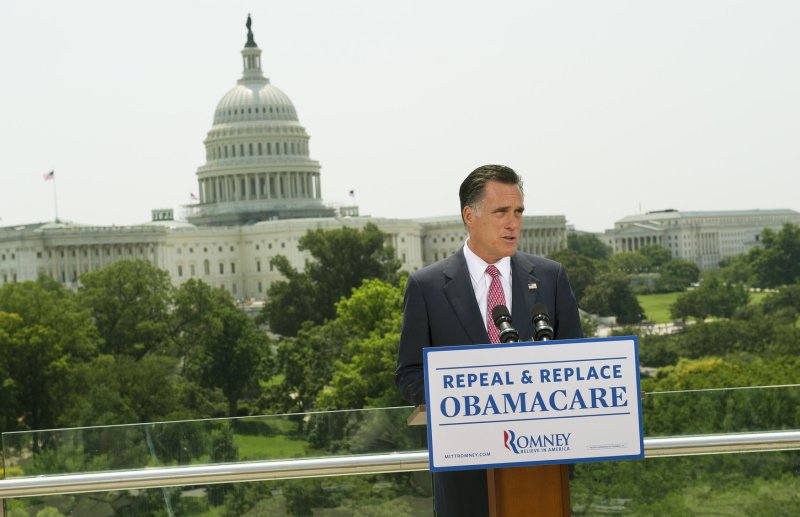1 of 2 | Republican presidential candid Mitt Romney delivers remarks on the Affordable Care Act, President Obama's health care reform bill, after the Supreme Court upheld a majority of the law, in Washington, D.C. on June 28, 2012. The Supreme Court upheld the health care reform law's individual insurance mandate in a 5-4 decision. UPI/Kevin Dietsch |
License Photo
WASHINGTON, July 18 (UPI) -- The question "Is America a democracy" may seem hopelessly dumb. After all, by a wide margin, Americans say the United States is the greatest democracy in the world.
Inspired by the Declaration of Independence and the U.S. Constitution that have injected into law and the nation's DNA the values that preserve and defend individual freedoms and liberty, American democracy has flourished.
Where in any other Western democracy for example could the son of a Kenyan goat herder aspire to and become a nation's president? And why have so many immigrants sought refuge, protection and the opportunity offered by the United States?
That said, "Is America a democracy?" becomes more serious in light of the electoral process; overly excessive laws and federal regulations; and responses to terrorism and technology.
Regarding the first, despite universal suffrage, Americans still don't elect their president directly. An unelected group of officials in the Electoral College determines who wins office, with 270, the number of electoral votes needed to win and not a majority of popular votes cast decide the presidency as the 2000 election vividly showed.
The reality in the 2012 electoral cycle is that both campaigns have fixated on about a dozen "swing" states that will determine the outcome. Hundreds of millions of dollars will be spent on these select dozen with Ohio perhaps being the most important to winning or losing the presidency. Thus, cynics or pragmatists ask why not excuse the rest of the nation from voting and allow Ohio to determine the winner? That would save everyone time and money.
After over two centuries, the constitutional requirement for an Electoral College is long past its sell-by date. Amending the Constitution to eliminate the college and let the popular vote elect the president or make the college proportional instead of winner take all would be a great step toward democratizing the process. All 50 states and territories would be in play, not just a handful. The result: some 150 million-200 million voters instead of 270 electors would directly elect our presidents.
Excessive laws likewise raise doubts on how democratic America is. The size of our prison populations, the world's largest, is a disgrace and more than symptomatic of injustice. Mandatory sentencing, a narrow slice of which regarding minors was ruled unconstitutional, is a large part of the problems especially regarding illegal drugs. Hence the proportion of African-American and Hispanics in jail is obscenely high.
Federal regulations too impinge on our democracy especially when aimed at trying to regulate social behavior. The Sarbanes-Oxley and Dodd-Frank laws regarding corporate governance and finance impose major costs and penalties on the private sector with little value added and in some cases are ludicrous. Hand in hand with the notion of democracy is the need for free markets provided there is proper accountability and oversight. There are better ways to achieve both through more sensible laws and regulations that do not impose and intrude so deeply and often unfairly on our freedoms and democracy as this column has frequently suggested.
Perhaps the most grievous assaults on democracy arise from responses to terrorism and technology. Because of the war on terror, a truly counterproductive term, the use of drones and targeted assassinations has become an antiseptic weapon of choice.
The issue is ensuring that a measure of credible and transparent due process is in place. The killing of Anwar al Awlaki, an American-born Yemeni cleric who was high in al-Qaida's leadership may have been justified but the precedent of killing an American citizen without transparent due process is both a stain on our notion of democracy and a chilling precursor of more to come if, for example, extended to targeting other Americans living outside the law and deemed enemies of the state.
Similarly, killing enemy combatants is fair game if the process for targeting is legitimate and collateral damage is held to the minimum. But imagine if Mexico or other states were to use drones to target drug kingpins or enemies inside America. One can imagine U.S. reactions.
Technology presents another great challenge to democracy. Cellphone intercepts are ancient history. Now that cellphones more fully use cyberspace, what about text messaging, GPS locating data and e-mail archives?
Where does privacy start and stop and government intrusion begin either for national security or law enforcement reasons?
Indeed, intrusive airport security searches by most standards violate the spirit as well as the substance of Fourth Amendment prohibitions against illegal search and seizure.
America isn't just a great country. It is a great idea. And its values as enshrined in its founding documents are the heart of our democracy. But not questioning or challenging flaws, faults, excesses and infringements on our democracy, to me, is a rejection of our duties as citizens and as good Americans.
--
(Harlan Ullman is chairman of the Killowen Group, which that advises leaders of government and business, and senior adviser at Washington's Atlantic Council.)
--
(United Press International's "Outside View" commentaries are written by outside contributors who specialize in a variety of important issues. The views expressed do not necessarily reflect those of United Press International. In the interests of creating an open forum, original submissions are invited.)















